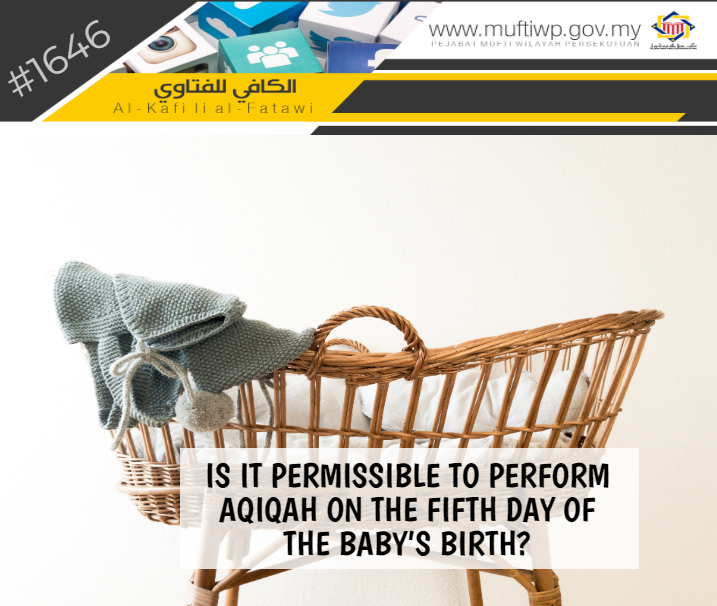Question:
Assalamualaikum, I want to ask whether it is permissible to perform the aqiqah on the fifth day of the baby’s birth?
Answer:
Waalaikumussalam. Alhamdulillah, praise and thanks to Allah for the countless blessings He has blessed us all with. Blessings and salutations to the Prophet Muhammad PBUH, his wives, his family, companions and all those that follow his teachings to the day of judgement.
The term aqiqah means the slaughter of animals of sacrifice as a sign of gratitude on the birth of a child with the intention to do so on certain conditions. (See al-Mausuah al-Fiqhiyyah al-Kuwaitiyyah, 30/276)
The ruling for aqiqah is sunnah muakkad for those who are capable. (See al-Majmu’ Syarh al-Muhazzab, 8/426). The origin of its sanctioning is according to a hadith from Salman bin Amir al-Dhabbi RA, where he heard the Prophet PBUH said:
مَعَ الْغُلاَمِ عَقِيقَتُهُ فَأَهْرِيقُوا عَنْهُ دَمًا وَأَمِيطُوا عَنْهُ الأَذَى
“Aqiqa is to be offered for a (newly born) boy, so slaughter (an animal) for him, and remove harm from him.”
Sahih al-Bukhari (2839)
It is sunnah to be performed on the seventh day of the baby’s birth and to give a good name for the baby as well as shaving the baby’s hair. This is in accordance with the statement of the Prophet PBUH from Samurah RA:
الْغُلاَمُ مُرْتَهَنٌ بِعَقِيقَتِهِ يُذْبَحُ عَنْهُ يَوْمَ السَّابِعِ وَيُسَمَّى وَيُحْلَقُ رَأْسُهُ
"The boy is mortgaged by his 'Aqiqah; slaughtering should be done for him on the seventh day, he should be given a name, and his head should be shaved."
Sunan Abu Daud (1522)
According to the above hadith, the determination of it to be performed on the seventh day is just sunnah. If a person wants to perform it before the seventh day or after it, then he will still receive the rewards of aqiqah according to madhhab Syafie. (See al-Majmu’, 8/431)
Syeikh Zakariyya al-Ansari Rahimahullah (died in 926 H) said the time for aqiqah is right after the birth of the baby until the child reaches puberty. (See al-Ghurur al-Bahiyyah, 5/171)
According to another hadith, from Buraidah bin Husoib al-Aslami RA:
العقيقةُ تُذْبَحُ لسَبْعٍ، أوْ لِأَرْبَعَ عشرَةَ، أوْ لِإِحْدى وعشرينَ
“The slaughter of aqiqah is on the seventh, 14th or 21st day.”
Narrated by al-Baihaqi (19771)
Originally, it is sunnah on the seventh day. However, if one is incapable it can be performed on the 14th day, if he is still incapable then perform it on the 21st day. If he is still incapable, then it can be performed whenever he is capable. This is the opinion issued by Dar al-Ifta’ Egypt [1].
Some contemporary Syafieyyah scholars are of the opinion that if a person is incapable to perform aqiqah, but after seven days of his baby’s birth, he is then capable, it is no longer sunnah for him to perform aqiqah. While other Syafieyyah scholars state that it is until before the nifas (post-natal bleeding) ends. The chosen opinion in madhhab al-Syafie state that its sunnah ruling is up till the baby reached puberty. After reaching puberty, it is sunnah for the child to perform the aqiqah for himself. (See Mughni al-Muhtaj; 6/139)
Please refer to an in-depth discussion on aqiqah after the child reached puberty through the link https://muftiwp.gov.my/en/artikel/al-kafi-li-al-fatawi/787-al-kafi-633-the-ruling-of-aqiqah-for-yourself
This is also the opinion of madhhab Hanbali. The reason is the worship of aqiqah is sanctioned as an act of showing gratitude for the blessing of a child by Allah SWT through the child’s birth. Considering that the first up to the seventh day is included as the range of days of birth, then performing aqiqah in this duration is valid and permissible. The permissibility is analogically deduced with the issue of paying the kafarah of oath before actually violating the oath. (See al-Kafi Ibn Qudamah, 1/547)
To conclude, it is permissible to perform the aqiqah on the fifth day if one is unable to perform it on the seventh day, it is encouraged to be performed on the 14th or 21st day according to the above hadith from Buraidah. If this is not possible, then it can be performed whenever the person is able to do so before the child reaches puberty.
Hopefully, the above explanation will ease the matter of aqiqah for your family.
Wallahua’lam.
Endnotes:
[1] Please refer https://www.dar-alifta.org/ar/ViewFatwa.aspx?ID=12452&LangID=1&MuftiType=0&%D8%A7%D9%84%D8%B9%D9%82%


